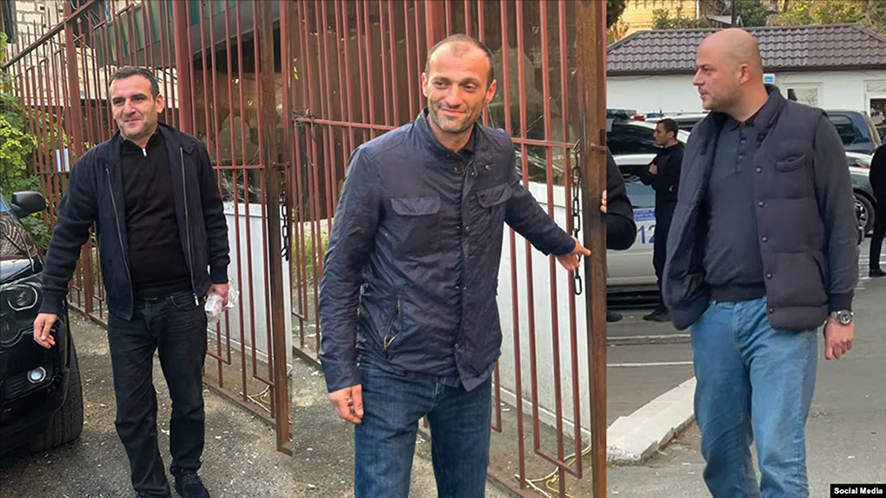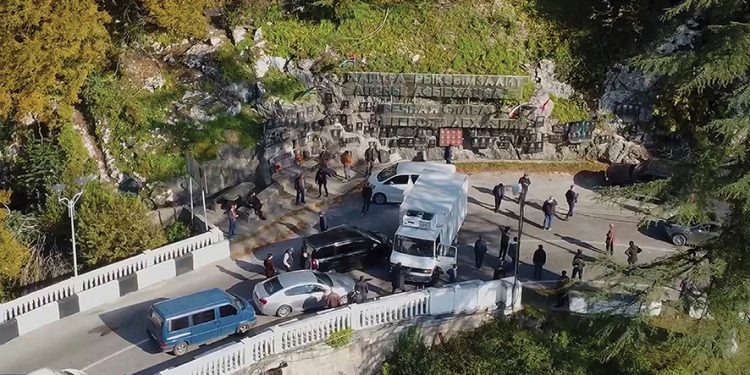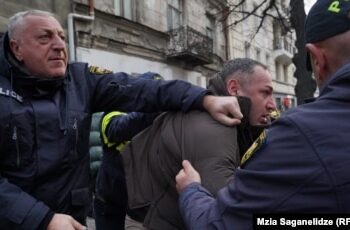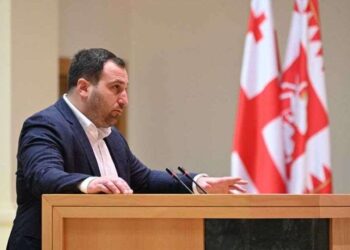Tensions flared in the de facto Republic of Abkhazia this week following the arrest of five prominent opposition figures: Omar Smyr, Garry Kokaia, Almaskhan Ardzinba, Ramaz Jopua, and Aslan Gvaramia. The arrests, linked to resistance against a controversial legislative package that would enable Russian investments and property ownership in Abkhazia, sparked widespread protests. Local social media broadcast tense confrontations outside the State Security Service headquarters in Sokhumi, and unconfirmed reports on Tuesday suggested the presence of military vehicles, raising fears of further escalation.
The opposition, especially in Gudauta, has staunchly opposed the deal, which they see as another step toward Abkhazia’s erosion of autonomy under Russian pressure. In response, they are planning a major rally on November 15, timed with the de facto parliament’s discussion of the investment package. The legislation would grant Russian companies preferential tax exemptions on property investments in Abkhazia, which many fear will tighten Moscow’s economic grip on the region. Aslan Bzhania, the Russia-backed de facto leader, has defended the move as necessary to fulfill Sokhumi’s obligations to Moscow, despite growing criticism of his handling of the situation.
Georgian Government’s Inaction Draws Criticism
The escalating crisis has drawn sharp rebukes from Georgia’s human rights community. The Social Justice Center (SJC) condemned the Georgian Dream government’s “policy of silence and inaction,” accusing it of allowing Russia’s annexation efforts to advance unchecked. The watchdog criticized the government’s failure to make political statements either domestically or internationally to challenge Russia’s actions in Abkhazia. “This passive approach undermines Georgia’s sovereignty and contradicts its obligations to protect human rights in occupied territories,” the SJC stated.
In addition to its silence, the Georgian government has faced growing international pressure as Moscow, frustrated by Abkhazia’s delays in implementing key agreements, drastically reduced financial support to the region in September. This has only heightened the tension and exacerbated security concerns for the Black Sea region. The SJC called on the Georgian government to strengthen its diplomatic efforts to counter Russia’s encroachment.

Protests Intensify, Local Blockades Persist
In response to the arrests, residents in Abkhazia’s Gudauta and Kodori regions, demanding the release of opposition leaders, blocked three bridges that give access to the capital, Sokhumi, resulting in long backups on the region’s twisting roads. The protests reflect wider discontent with Russian influence and the continued erosion of Abkhazia’s political autonomy. The planned November 15 rally coincides with the de facto parliament’s expected ratification of the Russian-backed investment deal, making it a pivotal moment in the growing resistance to Moscow’s control.
Authorities warned that blocking critical infrastructure is a criminal offense and vowed to take action against those responsible. But on Tuesday night, the arrested activists were released and the protestors lifted the blockades.
Despite the local opposition, Bzhania’s government has clearly aligned with Russian interests, further straining Abkhazia’s already fragile relationship with Georgia and complicating efforts at conflict resolution.
The Need for a Proactive Georgian Response
The SJC has called for the Georgian government to adopt a more proactive stance, urging it to engage diplomatically to counter Russia’s growing influence in the region. The watchdog stressed the need for a new peace policy that prioritizes regional stability and Georgia’s sovereignty, noting that the government’s failure to update its peace policy document only deepens the perception of inaction.
As the situation in Abkhazia continues to unfold this week, it is clear that the Georgian government must act swiftly to safeguard its territorial integrity and address the growing security risks posed by Russian expansion.
By Team GT














